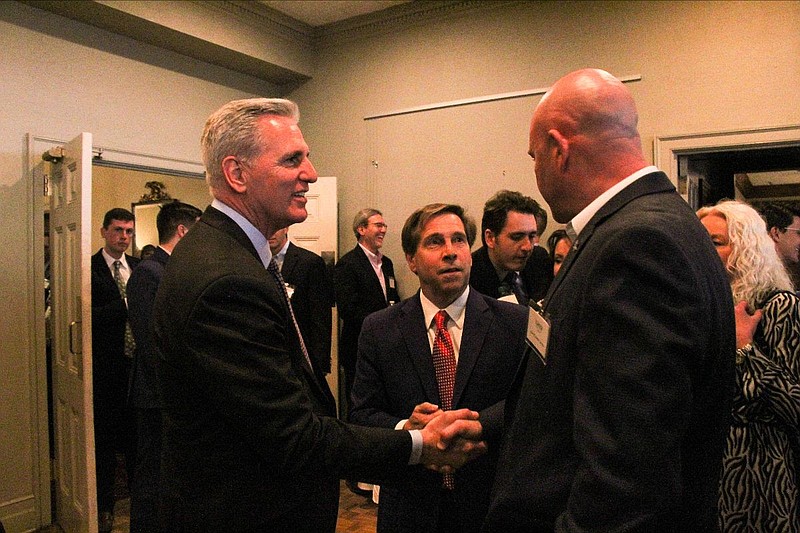NASHVILLE -- U.S. House Speaker Kevin McCarthy, R-California, was in Chattanooga last week for a campaign fundraiser for Congressman Chuck Fleischmann, R-Ooltewah.
While the congressman, a member of the House Appropriations Committee and chairman of the panel's Energy and Water Subcommittee, is no slouch at raising campaign cash, there's evidently nothing like a speaker to turbocharge attendance and result in contributions flooding in.
Fleischmann raised more than $500,000 at the event, held at the Mountain City Club, a Fleischmann campaign spokesman told the Chattanooga Times Free Press in response to an email request.
McCarthy heaped praise on Fleischmann in a statement.
"Chuck is a leader in our Republican conference, and he is working tirelessly to fix our economy, stop illegal immigration, and get our country back on track. East Tennesseans are well-served by his conservative leadership," the speaker said.
Fleischmann returned the compliment.
"Tennesseans and all Americans are better off with Kevin McCarthy as speaker of the United States House of Representatives," Fleischmann said. "Thanks to Speaker McCarthy's leadership, we now have efficiency, transparency, honesty and action back in the House, and I look forward to our continued partnership to ensure our shared conservative values are always upheld in Washington."
Term limits for thee — but not for me?
The Tennessee Republican-controlled House plans to vote Monday on a GOP measure seeking to push an "Article 5 Convention," joining an ongoing effort by Republican states to amend the U.S. Constitution to impose term limits on representatives and senators.
"This effort is currently active in 19 states," Rep. Chris Todd, R-Jackson, told House State Government Committee members last week while presenting his House Joint Resolution 5. "We are well on our way to completing this process calling for a very narrow Article 5 convention."
It's one of two ways the Constitution can be amended. Congress, by a two-thirds vote of both houses, may propose amendments to the states for ratification, a procedure that has been used for all 27 amendments. Alternatively, on the application of the legislatures of two-thirds of the states, 34 at present, Article V directs that Congress "shall call a Convention for proposing Amendments."
It takes 38 of the 50 states, three-fourths, to ratify a constitutional amendment. Republicans control both chambers in 28 states, while Democrats hold majorities in 19 states, Three states are split
State-led efforts for Article 5 conventions have been attempted in the past on any number of issues, including a balanced budget requirement for the federal government. None have succeeded.
The Constitution came into effect in 1789. It replaced the Articles of Confederation, which had been adopted by the Continental Congress in 1777. That wasn't going well, and changes were sought, according to the National Archives website. Delegates, who closed their proceedings in Independence Hall to the public and swore themselves to secrecy, emerged with the U.S. Constitution in 1787. It was ultimately ratified by the states.
Ever since, concerns have been raised that an unrestrained convention could re-write the Constitution.
During the Tennessee House State Government debate, Rep. Iris Rudder, R-Winchester, raised that issue.
"We're going to send delegates to this convention, and all the discussion is around term limits," Rudder said. "But would you verify for me your opinion, if we open this convention, is term limits all they're allowed to discuss? Or will they be discussing any other article of the Constitution they would like to change at that time?"
Todd sought to reassure Rudder and others on the panel.
"All this resolution authorizes is the one single item of term limits for Congress and the Senate," Todd said. "Our delegates would not be directed or allowed to debate or discuss any other constitutional amendment."
Rudder didn't appear to be satisfied with Todd's answer.
"That gives me pause because I don't necessarily, I'm not saying I don't believe your intentions. But I don't know if we send delegates to a convention, they would not open other articles in the Constitution," Rudder said. "I don't now that, personally, I'm ready to give that authority to anyone because I think the Constitution's a pretty wonderful document as it is today. Although I certainly feel the heartburn for term limits for Congress, and I wish there were some other way to get there.
"But for me this is not the avenue we should do that," she said.
Todd insisted Tennessee delegates won't veer off the tracks. That, he said, is because of a previously passed state law allowing a delegate to be recalled and replaced. Their vote would also be considered "null and void," he said.
Moreover, Todd said, anyone who votes outside their state's instruction would be subject to being charged with a felony punishable by two to 12 years imprisonment and fines of up to $5,000.
An official with U.S. Term Limits testified in favor of the resolution.
Not all conservative groups agree. The John Birch Society, which didn't have a representative there, vehemently opposes it.
"An Article V Constitutional Convention would threaten individual rights and our nation's very form of government," the John Birch Society said on its website. "Individual rights are secured by the Constitution, and a Con-Con would have the inherent power to become a 'runaway' convention that could completely change the Constitution."
During the state House State Government Committee debate, Rep. Larry Miller, D-Memphis, was skeptical of Todd's effort.
"This is something we want to impose on Congress, the United States Congress," Miller said before adding, "but we certainly wouldn't impose it upon ourselves."
Contact Andy Sher at asher@timesfreepress.com or 615-285-9480.
